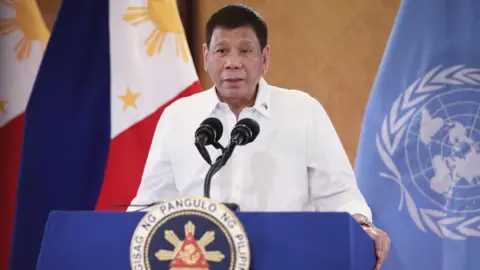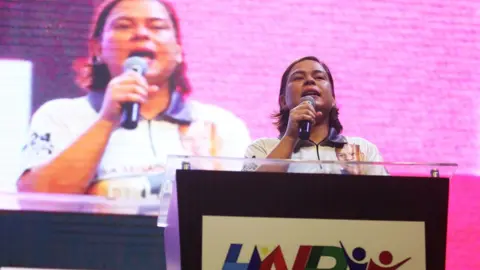Rodrigo Duterte: Philippine president announces retirement from politics
 EPA
EPAPhilippine President Rodrigo Duterte says he is retiring from politics and will not stand in elections next year.
The 76-year-old leader said last month that he would run for the vice-presidency in 2022. The country's constitution only permits presidents to serve a single six-year term.
But he now says he will withdraw, as "the overwhelming sentiment of the Filipinos is that I am not qualified".
The move comes amid speculation that his daughter could run for president.
Mr Duterte, a controversial "strongman" figure, came to power in 2016 promising to reduce crime and fix the country's drug crisis.
But critics say that during his five years in power, Mr Duterte has encouraged police to carry out thousands of extrajudicial killings of suspects in what he has called his "war on drugs".
Mr Duterte's daughter Sara Duterte-Carpio, who is currently mayor of the southern city of Davao, has given mixed messages about running for high office.
Last month Ms Duterte-Carpio said that she would not join the race because she and her father had agreed that only one of them would stand in the election next May.
However, she has led every opinion poll conducted this year.
Mr Duterte announced his surprise retirement at the venue in Manila where he was expected to register his candidacy.
He said that standing for the vice-presidency "would be a violation of the constitution to circumvent the law, the spirit of the constitution".
His spokesman Harry Roque, however, did not entirely rule out a political role for Mr Duterte in the future.
Mr Roque told the BBC that the announcement "means that he is not interested in the vice-presidency anymore - as to whether or not he will completely retire from politics, I would have to clarify this point with him".


President Duterte's announcement should be taken with a pinch of salt.
He has form in saying similar things, only to make U-turns weeks later. In September 2015, in the build-up to the presidential elections, the then-mayor of Davao said he planned to "retire from public life for good".
But in a last-minute move in November that year, Mr Duterte was chosen as the PDP-Laban party's candidate. He went on to win the presidency in May 2016.
Commentators say Saturday's announcement is in keeping with the "2015 playbook", with some speculating Mr Duterte could be a "super sub" for his ally Senator Christopher "Bong" Go, who has filed his candidacy for vice-president.
The drama plays well with voters, many of whom spend evenings glued to their TVs watching the twists and turns of the saga.
Mr Duterte is a shrewd operator who will know the announcement will place his family's name at the heart of his country's "tsismis", the Filipino word for gossip.

When Mr Duterte first announced his intention to run, there was widespread speculation that he would seek a politically weak running mate in order to rule from the number-two role.
He had also publicly mused that, as vice-president, he would be immune from prosecution by the International Criminal Court (ICC) for presiding over the brutal "war on drugs" that has killed thousands in the country.
However, it was unclear whether he would have retained legal immunity.
 Reuters
ReutersAccording to the human-rights organisation Amnesty International, more than 7,000 people were killed by police or unknown armed attackers in the first six months of Mr Duterte's presidency.
In June, the ICC prosecutor applied to open a full investigation into drug war killings in the Philippines, saying crimes against humanity could have been committed.
If Ms Duterte-Carpio were to be elected president, correspondents say she would be likely to protect her father from criminal charges in the Philippines and from ICC prosecutors.
